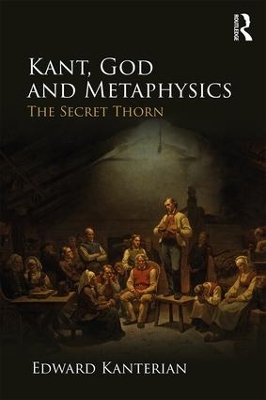
Kant, God and Metaphysics
Routledge (Verlag)
978-1-138-90858-1 (ISBN)
Kant is widely acknowledged as the greatest philosopher of modern times. He undertook his famous critical turn to save human freedom and morality from the challenge of determinism and materialism. Intertwined with his metaphysical interests, however, he also had theological commitments, which have received insufficient attention. He believed that man is a fallen creature and in need of ‘redemption’. He intended to provide a fortress protecting religious faith from the failure of rationalist metaphysics, from the atheistic strands of the Enlightenment, from the new mathematical science of nature, and from the dilemmas of Christian theology itself. Kant was an epistemologist, a philosopher of mind, a metaphysician of experience, an ethicist and a philosopher of religion. But all this was sustained by his religious faith.
This book aims to recover the focal point and inner contradictions of his thought, the ‘secret thorn’ of his metaphysics (as Heidegger once put it). It first locates Kant in the tradition of reflection on the human weakness from Luther to Hume, and then engages in a critical, but charitable, manner with Kant’s entire pre-critical work, including his posthumous fragments. Special attention is given to The Only Possible Ground (1763), one of the most difficult, interesting and underestimated of Kant’s works. The present book takes its cue from an older approach to Kant, but also engages with recent Anglophone and continental scholarship, and deploys modern analytical tools to make sense of Kant. What emerges is an innovative and thought-provoking interpretation of Kant’s metaphysics, set against the background of forgotten religious aspects of European philosophy.
Edward Kanterian is Senior Lecturer in philosophy at the University of Kent. Previously he was a lecturer in philosophy at the University of Oxford. His research interests include metaphysics, the philosophy of logic and language, the ethics of memory, and modern philosophy. He is the author of several books, the most recent of which is on Frege’s logic.
Acknowledgements. Introduction. Chapter One: From Luther to Hume – the Weakness Motif in the Tradition. Introduction. 1.1 The First Circle: The Certainty of Salvation. Erasmus. Luther. The Problem of Evidence. Further Developments. 1.2 The Second Circle: The Rise of Protestant Orthodoxy. Securing Faith. The Return of Aristotle. Further Developments. 1.3 The Third Circle: The New Science and its Philosophy. From Copernicus to Montaigne. Descartes. The Reaction to Descartes. Spinoza. Further Developments. Pascal and Bayle. 1.4 The Fourth Circle: Triumph and Peril of Reason. Newton. Leibniz. Pietism and Thomasius. Wolff. Boyle and Locke. English Deism, Hume and French Atheism. 1.5 Conclusion. Chapter Two: The Early Works. 2.1 Introduction. 2.2 The Beginning: Thoughts on the True Estimation of Living Forces. 2.2 God’s Glory: The Universal Natural History. The Character of the Work. Cosmology and Cosmogony: Kant’s Celestial Mechanics. Physico-theology: God and His Creation. The Abyss and the Sinking. Religion and Science: Some Predecessors. The Central Motifs. Anxiety, Fallenness, Faith and Revelation. The Chain of Creation: Glory and Vanity. The Human Fate. The Holy in Kant. 2.3 From Physico-Theology to Onto-Theology: The New Elucidation. The Principle of Sufficient Ground. The Theological Argument. Sin and Free Will. More on the Principle of Determining Ground. Causation and God. 2.4 The Modal Argument in the New Elucidation. Kant’s Modal Argument. Baumgarten’s Metaphysics of Possibility. Fragment R3733. Conclusion. Chapter Three: Intermission – The Period 1756-1762. 3.1 The Physical Monadology, the New Theory of Motion, and the False Subtlety Essay. 3.2 The Question of Optimism. The Optimism Essay. The Funk Essay. Two Optimism Models: Pope and Spalding. Crusius’s Optimism. Fragments R3704 and R3705. Chapter Four: The First Fortress: The Only Possible Ground of Proof for a Demonstration of the Existence of God.
| Erscheinungsdatum | 25.05.2016 |
|---|---|
| Verlagsort | London |
| Sprache | englisch |
| Maße | 156 x 234 mm |
| Gewicht | 793 g |
| Themenwelt | Geisteswissenschaften ► Philosophie ► Allgemeines / Lexika |
| Geisteswissenschaften ► Philosophie ► Erkenntnistheorie / Wissenschaftstheorie | |
| Geisteswissenschaften ► Philosophie ► Philosophie der Neuzeit | |
| Geisteswissenschaften ► Religion / Theologie | |
| ISBN-10 | 1-138-90858-4 / 1138908584 |
| ISBN-13 | 978-1-138-90858-1 / 9781138908581 |
| Zustand | Neuware |
| Haben Sie eine Frage zum Produkt? |
aus dem Bereich


